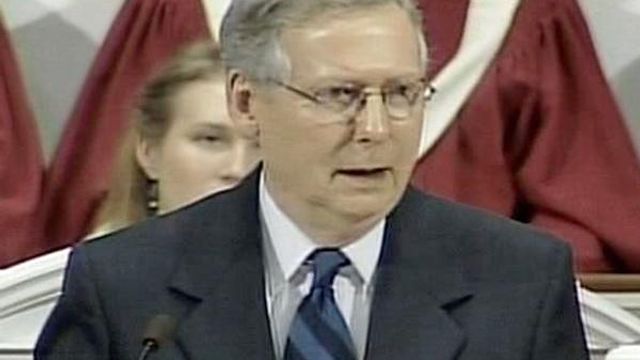'Good and faithful servant' Jesse Helms praised, remembered
Helms' adherence to his principles and his kindness to people were themes in eulogies delivered by speakers who included Senate Minority Leader Mitch McConnell, R-Ky.
Posted — UpdatedHelms, 86, died July 4 after years of declining health.
As he praised Helms, McConnell echoed a biblical passage read by Rev. Tom Bodkin, Hayes Barton associate pastor: "Well done, good and faithful servant. … Come and share in your master’s joy.”
Helms' adherence to his principles was a theme throughout the speakers' comments.
There is often a disconnect between how the public perceives a person and how that person is one-on-one, McConnell said. "No one seemed to suffer more from this peculiar disconnect more than Jesse Helms, and no one seemed to care about it less," he said as the congregation laughed heartily.
A frequent target of editorial-page critics, Helms was unfazed, McConnell recalled. He relished a wall covered with editorial cartoons about him, the minority leader said.
Once, after The New York Times had criticized Helms severely, McConnell said, an aide drafted an equally harsh response. Helms read it, then put his hand on the aide's shoulder and told him, "Son, just so you understand, I don't care what The New York Times says about me."
"He put duty above all else," McConnell said, "duty to God, to country, to family and a duty that's often overlooked – the duty of treating other people well."
"You always knew where Jesse Helms stood on the issues," but not how hard it could be to hold those stands in the face of criticism, his granddaughter, Wake District Judge Jennifer Knox, told the congregation.
"You can compromise on your preferences, but never your principles" was the lesson he taught, Knox said.
McConnell quoted a message that the singer Bono had sent to the Jesse Helms Center: "Give (Helms' wife) Dot and the family my love and tell them there are 2 million people alive in Africa because Jesse Helms did the right thing.”
Among those in the church were Sens. Chris Dodd, D-Conn., and Joseph Biden, D-Del., both of whom served with Helms on the Senate Foreign Relations Committee; Sen. Elizabeth Dole, who took Helms' seat when he retired in 2002, and her husband, former Sen. Robert Dole, who represented Kansas; and Cindy McCain, the wife of presumptive Republican presidential nominee John McCain.
Bodkin presided over the funeral services, and speakers included McConnell, former aide Jimmy Broughton and Helms’ grandchildren.
Also attending were most of the state's delegation in the U.S. House of Representatives.
Cheney flew in for the funeral, according to Cheney spokeswoman Megan Mitchell, and Interstate 40 was closed for his motorcade after he landed at Raleigh-Durham International Airport.
The coffin of Helms, who served in the Senate from 1973 to 2003, was covered with a U.S. flag and flanked by two state Highway Patrol troopers before the service began. The front of the sanctuary was decorated with flowers sent by U.S. senators and a painting of Helms at work.
He also ran racially tinged campaigns in his last two runs for Senate, defeating former Charlotte Mayor Harvey Gantt, who is black, in 1990 and 1996.
Copyright 2024 by WRAL.com and the Associated Press. All rights reserved. This material may not be published, broadcast, rewritten or redistributed.






